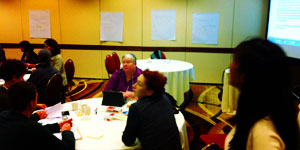Lessons Learned From a Faculty Learning Community on Blended Learning
A faculty learning community (FLC) comprised of six professors representing different disciplines was formed in 2011 to study, develop, and teach blended learning courses. As part of this project, we sought to evaluate the efficacy of blended learning on faculty (efficiency, satisfaction) using interview questions designed by Garrison and Vaughan (2011) and students (access, learning effectiveness, satisfaction) through survey responses including the Community of Inquiry (CoI) survey (Swan, et al., 2008).
This study found evidence that student perceptions of the CoI may be useful in predicting differences in students’ blended learning experiences. The study also found that perceived differences in blended learning experiences varied by discipline. This difference may be a result of differences between students, such as their age, or differences between instructors. A second research outcome was that FLCs are a useful form of professional development when correctly implemented. For example, faculty benefit from participation in an FLC when they receive helpful advice on promising practices and encouragement when experiencing instructional or technical challenges. On the other hand, FLCs are less effective when there is a lack of dialogue between meetings or when a facilitator does not provide adequate preparation for face-to-face meetings.
During our presentation we will share both faculty and student findings from our study. We will engage our audience by asking them to share promising practices for blended learning classrooms and professional development for blended learning instructors.
Cox, M. D. (2004). Introduction to Faculty Learning Communities. New Directions for Teaching and Learning, 5–23.
Garrison, D. R., & Vaughan, N. D. (2011). Blended Learning in Higher Education. San Francisco: Jossey-Bass.
Swan, K., Richardson, J. C., Ice, P., Garrison, D. R., Cleveland-Innes, M., & Arbaugh, J. B. (2008). Validating a measurement tool of presence in online communities of inquiry. e-Mentor, 24(2), 1-12.


